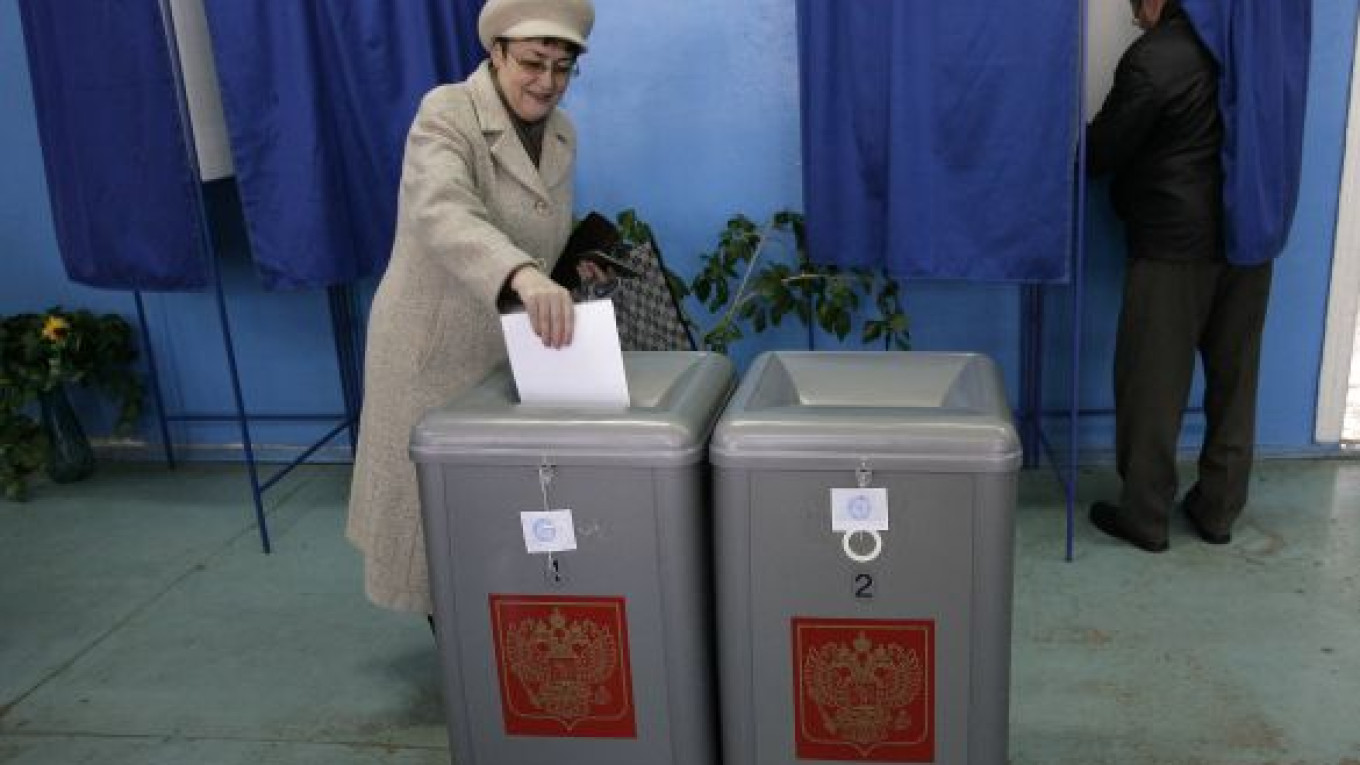Increased turnout and allegations of foul play were two hallmarks of the last big vote before State Duma vote in December, as almost 3,000 elections took place in all but nine regions nationwide Sunday.
Purported dirty tricks ranged from free moonshine and pop concert tickets to old-fashioned beatings and ballot stuffing, with both the ruling United Russia party — which is expected to sweep the elections — and the opposition pointing the finger at each other.
New legislatures were being elected in 12 regions: the Kursk, Kirov, Orenburg, Tambov, Kaliningrad, Nizhny Novgorod and Tver regions, the Chukotka and Khanty-Mansiisk autonomous districts and the republics of Dagestan, Adygeya and Komi.
Overall turnout "grew 3 to 5 percent compared with the previous elections" in these regions in 2006 and 2007, Central Elections Commission deputy head Leonid Ivlev told journalists Sunday afternoon, Interfax reported.
Early results indicated turnout was 40 percent to 44 percent in most regional legislature votes. In Dagestan, 70 percent of voters came to polling stations, the commission said, according to Interfax.
There were also more violations reported than in 2010 regional elections, the country's sole independent elections watchdog, Golos, said in an e-mailed statement. Most violations were related to voting outside polling stations; also, those who have absentee voting certificates are often allowed to keep them, which enables people to vote more than once, the group said.
Chukotka boasted an unusually high turnout of about 70 percent — which the Communists said was due to officials luring in voters with free tickets to an election day concert. A slew of pop stars, including Eurovision contest winner Dima Bilan, performed in the Arctic region on Sunday.
United Russia accused its opponents of dirty campaigning in a number of regions, including Kursk, Saratov and Stavropol. Most reported violations related to a smear campaign against the party that saw nighttime calls to sleeping voters urging them to support United Russia.
Election-related violence was reported in Kaliningrad and Dagestan, where police were on high alert to prevent clashes. A Dagestan lawmaker with the Communists, Alibulat Gasanov, was injured and his brother shot dead when unidentified gunmen pelted their car with bullets late Friday. Police said the attack might be related to the brother's activities, not Gasanov's re-election bid, but Central Elections Commission head Vladimir Churov nevertheless asked local police to boost security measures to protect candidates and their families.
In Kaliningrad, a Golos observer and reporter with its newspaper, Grazhdansky Golos was beaten at a village polling station, the watchdog said, adding that police were present at the scene but did not intervene. Local election officials said Vladimir Bogatyryov was expelled from the station because he made a scandal, but did not elaborate.
Another complaint was filed by two voters from the Kursk region, who said unidentified men attempted to buy their votes with bottles of vodka that turned out to be low-quality moonshine, Ivlev said. He did not specify which party attempted to purchase the vote this way.
The Central Elections Commission said Sunday evening that no serious violations had been registered.
A Message from The Moscow Times:
Dear readers,
We are facing unprecedented challenges. Russia's Prosecutor General's Office has designated The Moscow Times as an "undesirable" organization, criminalizing our work and putting our staff at risk of prosecution. This follows our earlier unjust labeling as a "foreign agent."
These actions are direct attempts to silence independent journalism in Russia. The authorities claim our work "discredits the decisions of the Russian leadership." We see things differently: we strive to provide accurate, unbiased reporting on Russia.
We, the journalists of The Moscow Times, refuse to be silenced. But to continue our work, we need your help.
Your support, no matter how small, makes a world of difference. If you can, please support us monthly starting from just $2. It's quick to set up, and every contribution makes a significant impact.
By supporting The Moscow Times, you're defending open, independent journalism in the face of repression. Thank you for standing with us.
Remind me later.


